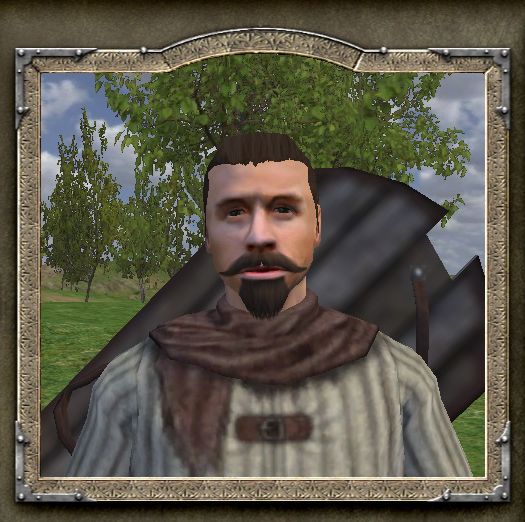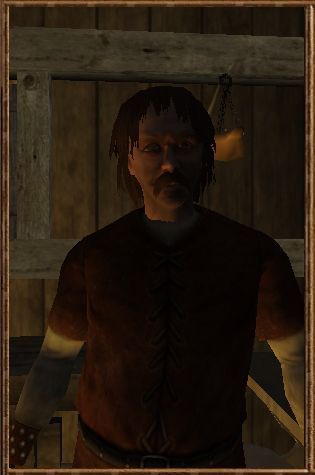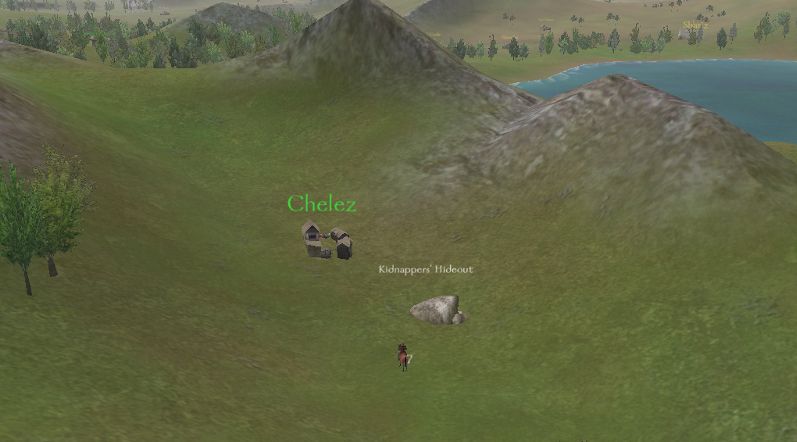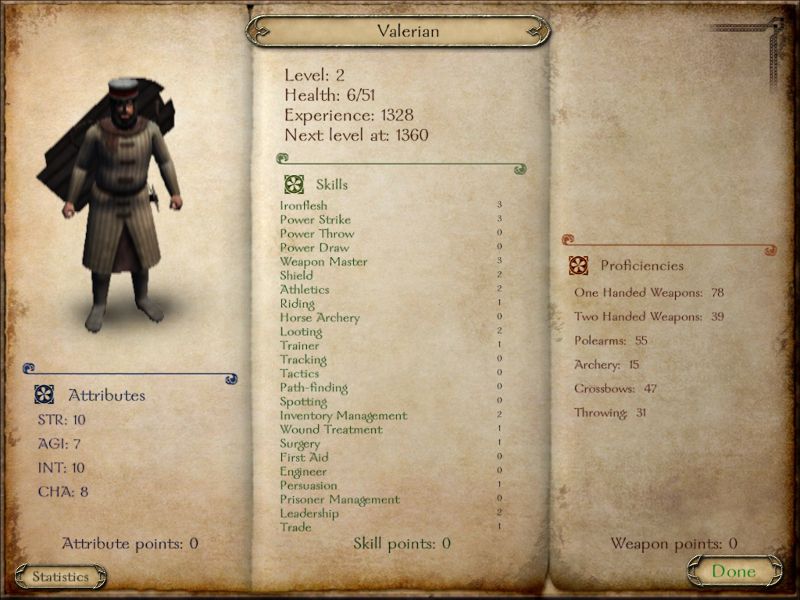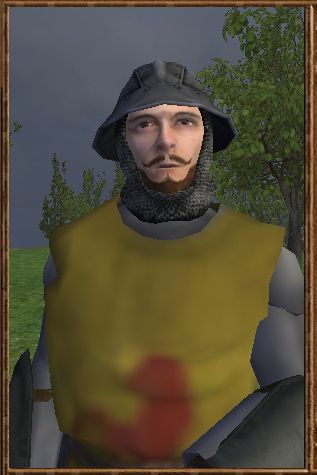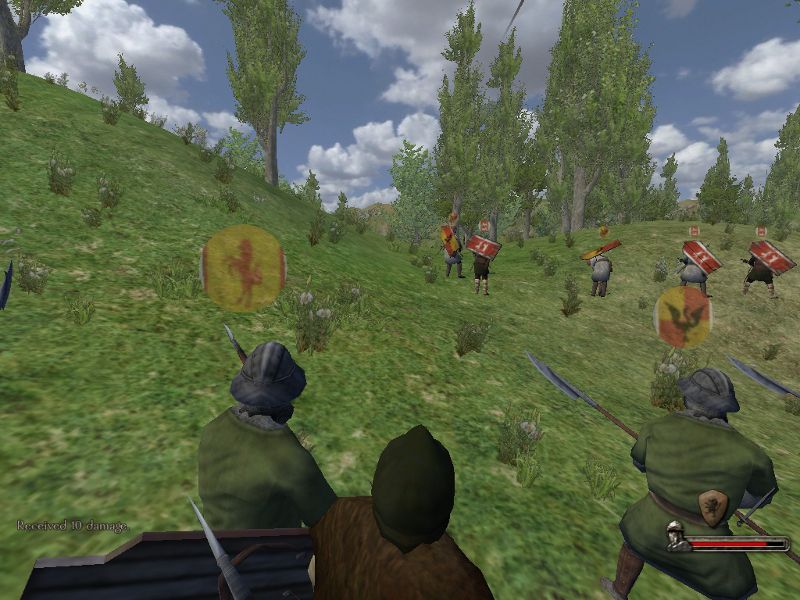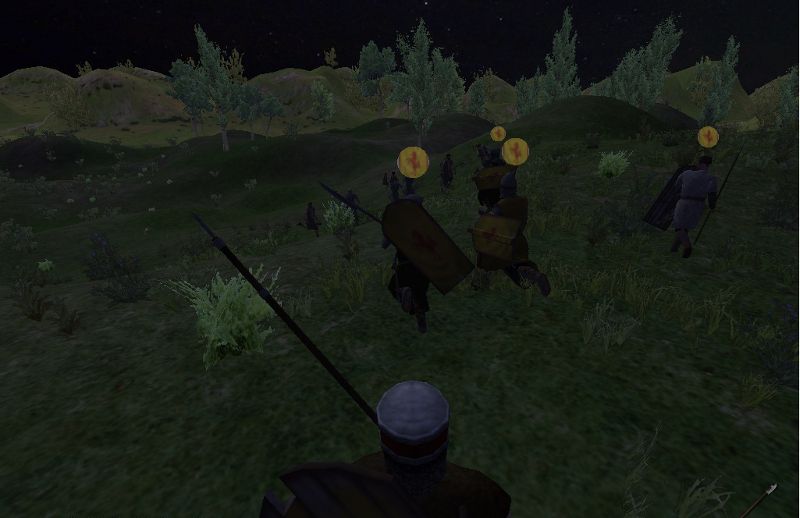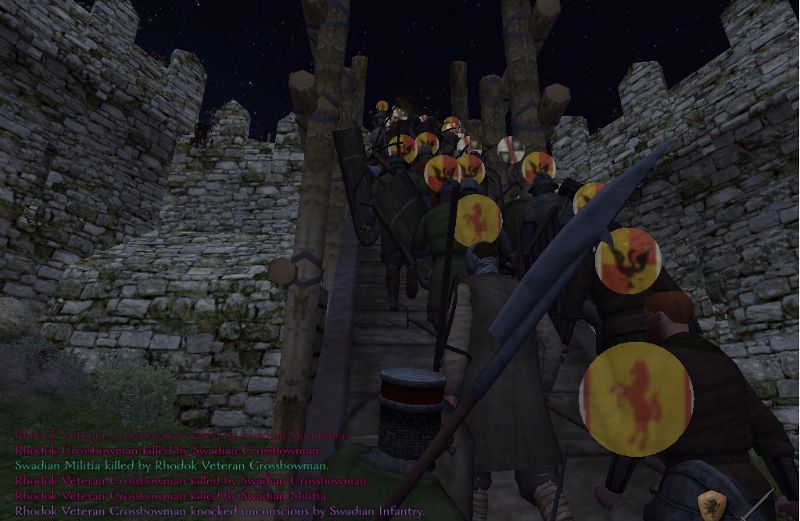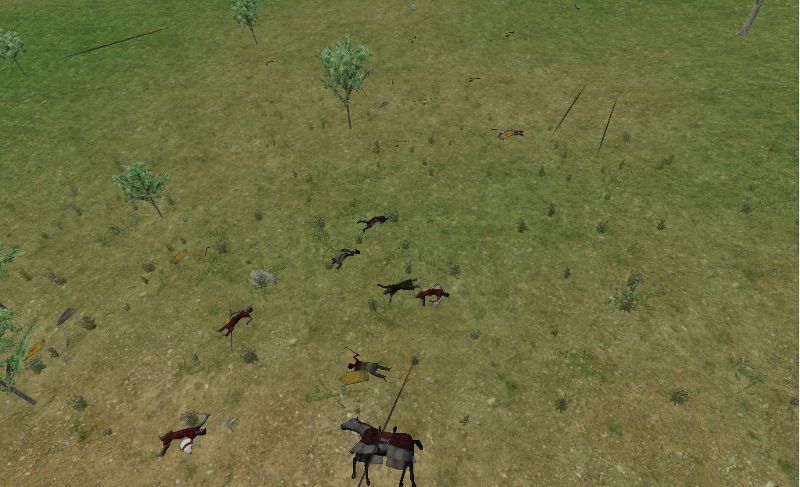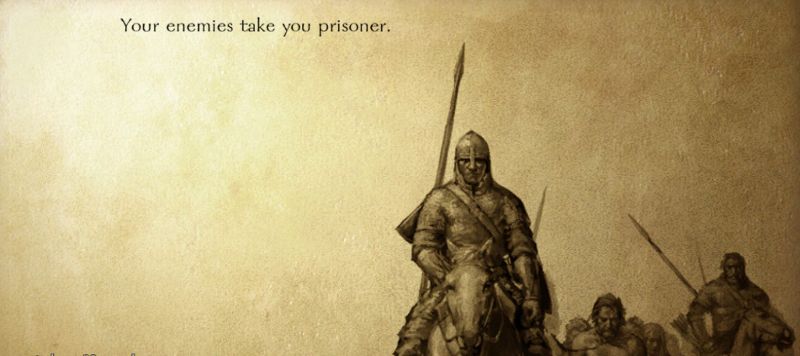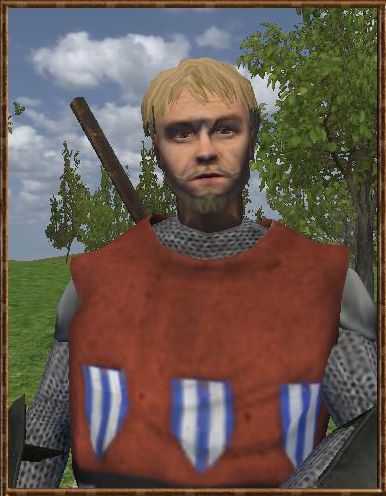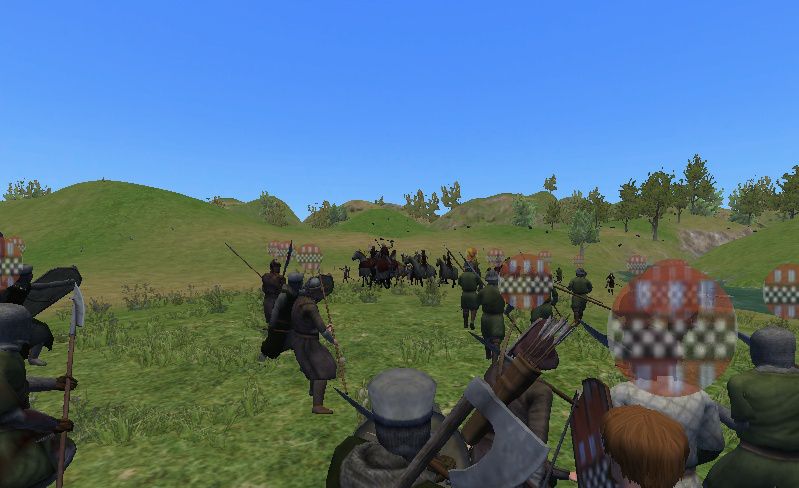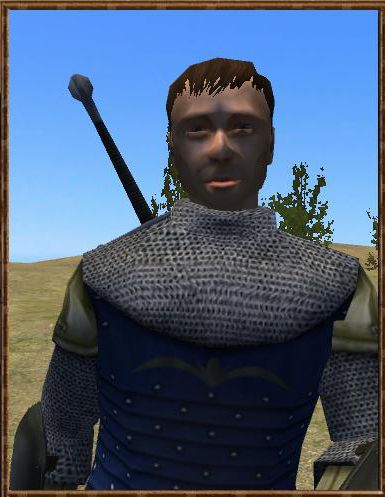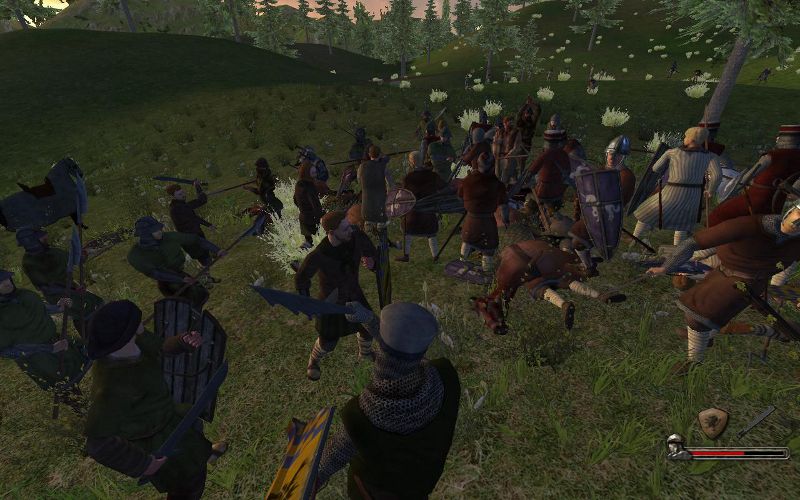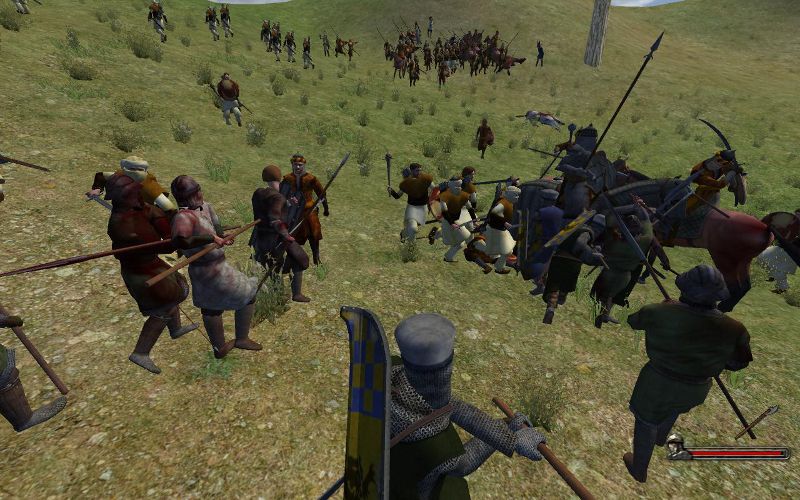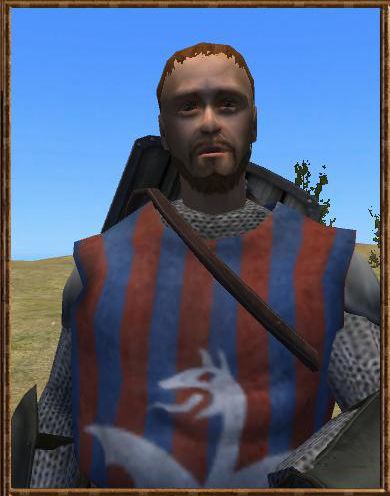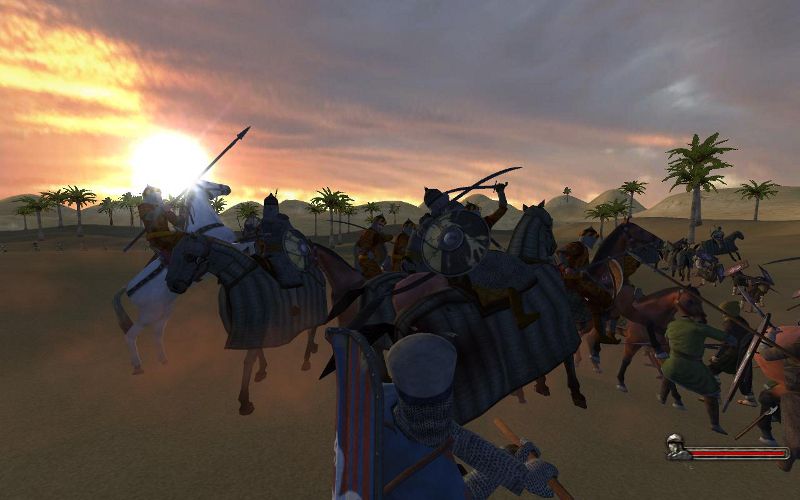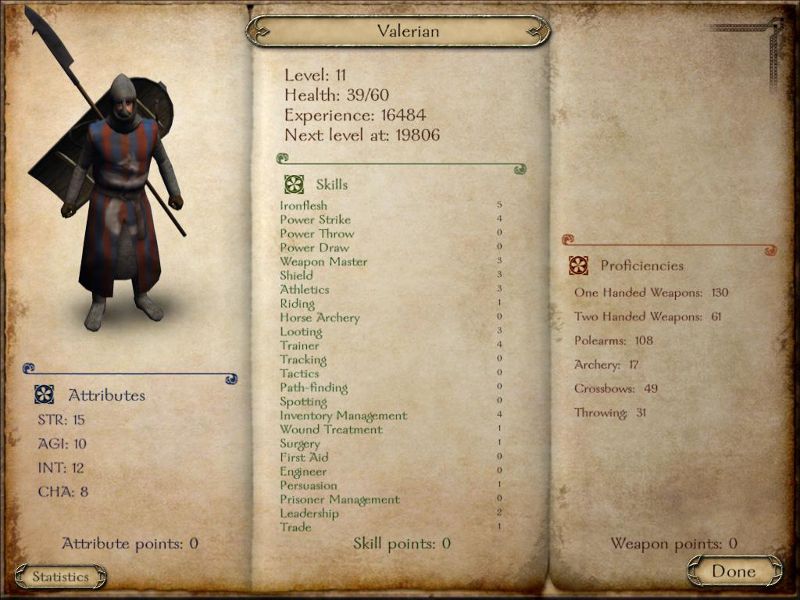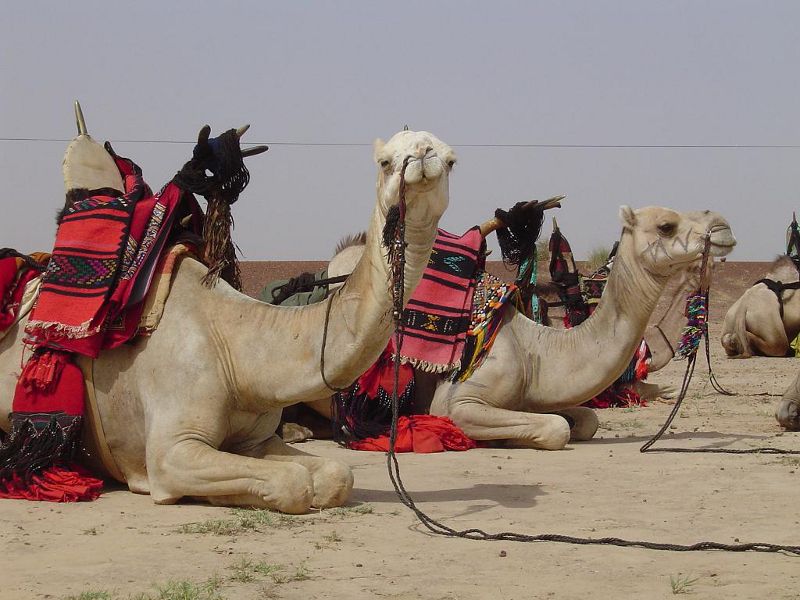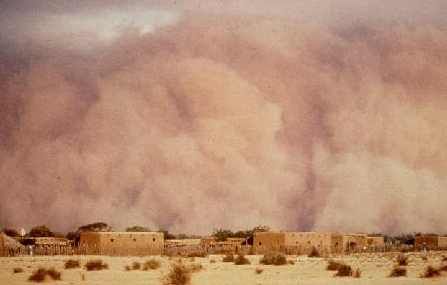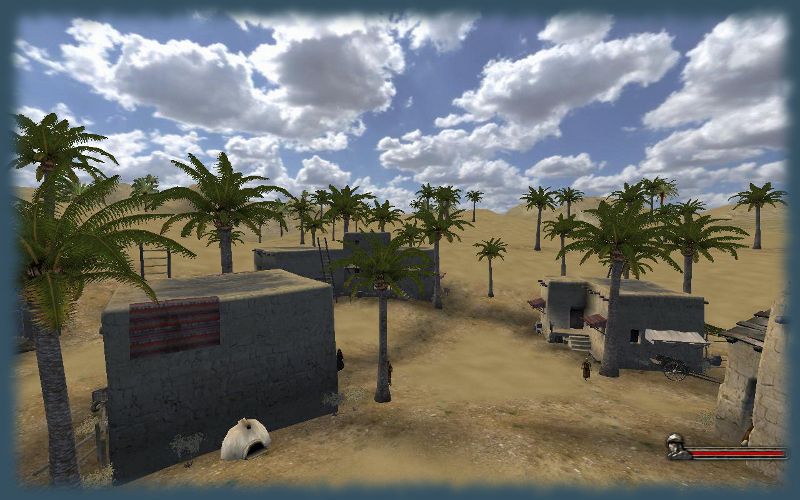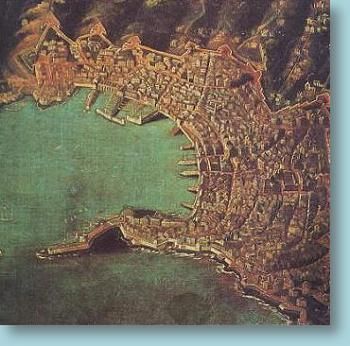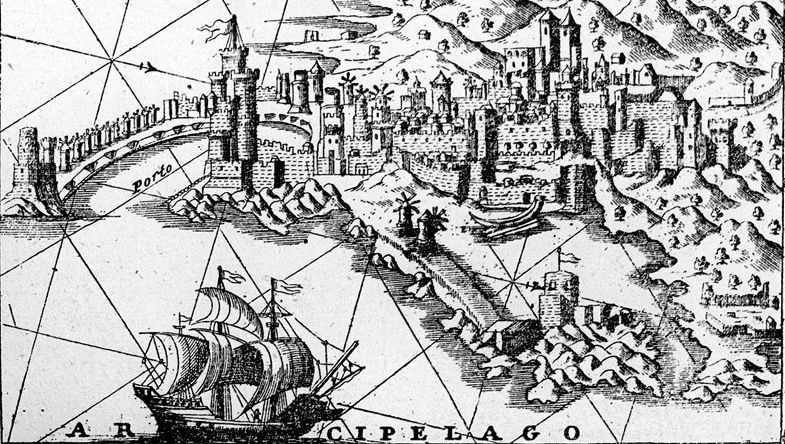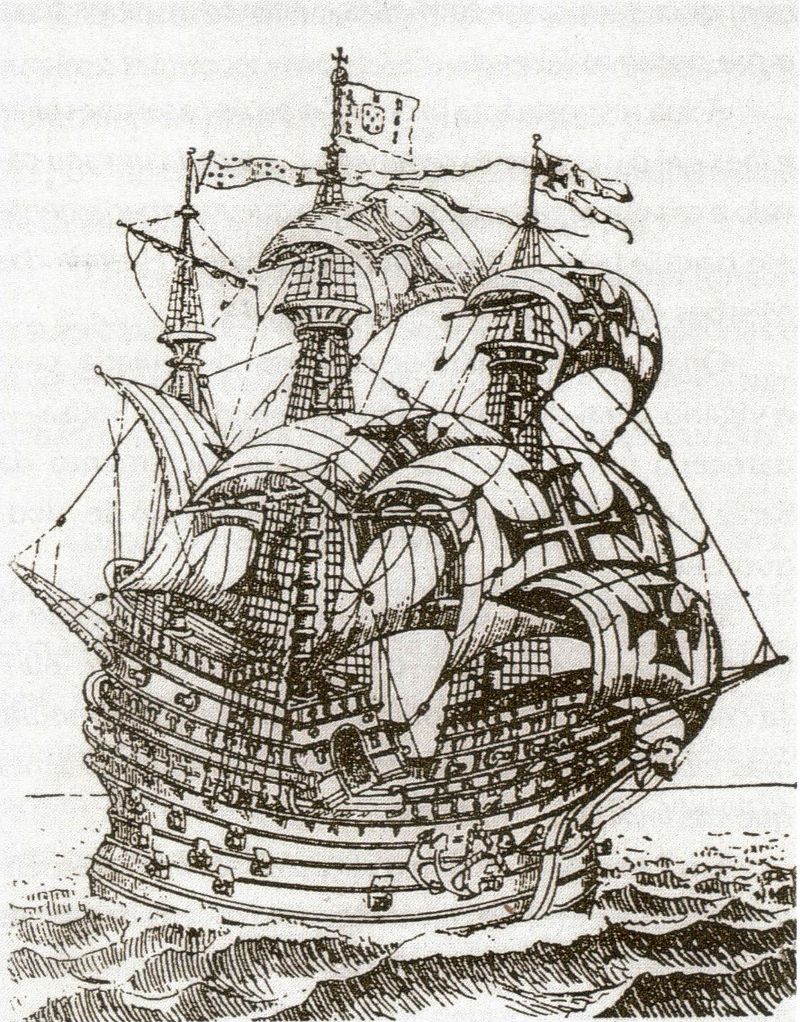Chapter V – Into the wilderness
December 19th 1257, somewhere in the field
It seems to be my lot in life to be disappointed. Just a few days ago the city of Veluca was abuzz with with preparations for a great celebration and we soldiers were spending more time in the taverns and brothels than in the camp, taking some well-earned leave for ourselves. But it all ended when another messenger came to see the King, this time bearing ill news. The Sarranids had apparently crossed the southern frontier and were now raiding many villages on the border, thus breaking the truce they had signed only a few months previously. It looks like the peace that I longed for didn't even last a week, if it ever existed at all. Now we're marching South along the edge of the mountains, and all of us hope we can put an end to this quickly.
January 3rd 1258, near Almerra Castle
We're getting closer to the border now, and it's starting to look like Count Meltor's campaign all over again. A lot of peasants are fleeing deeper into Rhodok territory, but the rumor is that the enemy have ventured even beyond Jamiche Castle along the coast.
I don't really know what to expect once we get there since I don't know much about the Sarranids and their ways of fighting. From what I've gathered from some of the more seasoned soldiers, they also put a great emphasis on heavy cavalry like the Swadians, but also use lighter cavalry to harass their enemies. If so, I don't think we will have any problems. I've already seen first-hand what a Rhodok spear line can do to a Swadian charge, so this should be little different.
January 8th 1258, on the southern Rhodok border
It seems I was wrong in many ways, some good, some bad. The good news is that this isn't like Count Meltor's campaign. The Sarranids are behaving more like bandits, taking whatever valuables they can carry, then fleeing across the border at the first sign of trouble. They're not burning whole villages to the ground and most of the peasant's supplies are still mostly intact. This means we won't starve like we did last time, but if it keeps up things might change. Fortunately I've also heard that the King has arranged for food to be brought in from Jelkala's storehouses. It probably won't be much, but it's better than nothing.
The bad news is that, while we would probably massacre their light cavalry in a fair fight, we'd have to catch them first. They use smaller horses than the Swadians and they're incredibly fast. We've encountered them a few times already and even when we took them by surprise they managed to make a run for it. Since we have precious few horsemen on our side I don't think we have any chance of catching them.
Also on a good note, winter doesn't seem to be as harsh as I had feared it to be around here. When we crossed the mountains the last time there was already quite a lot of snow in the passes but here the weather is pleasant, quite similar in fact to that of my homeland. The days are cool, but not cold and it rains quite often. That's still an annoyance, but much better than what I had expected.
January 15th
The Sarranids seem to be getting bolder instead of backing down now that we've arrived. Their raiding parties are getting bigger and now they're bringing infantry along as well. They also tried to fight us off instead of running away. I've been in a few such skirmishes so far and we've won each time since they seem to be poorly trained. Others, on the other hand, haven't been so lucky. A few groups have tried to pursue them across the border, but they never returned. Because of this, Count Tellrog has forbidden us from following them once they run, but our frustration is building.
Somehow, I think this is their plan, to draw us out in small groups then ambush us once we're far away enough from the main army.
January 18th 1258, Jamiche Castle
Two days ago we came across the largest raiding party so far, a force of over four hundred men led by Emir Bilyia and we were almost defeated. We encountered them a few kilometers east of Jamiche as they were pillaging the countryside. I'm not sure how they managed to get so far beyond the border, but as soon as they saw us approaching they formed-up for battle. Their force was larger than ours, but we were all eager for a fight after so many weeks of frustration.
We moved in cautiously at first while the missile troops exchanged fire. Their archers tried their best to stop us, but our large shields protected us well, and to be honest it wasn't as bad as the Swadian crossbow volleys I've faced in the past.
As soon as we got close enough, we charged and immediately their line began to waver. While there were twice as many of them as there were of us, but most were poorly trained levies, while most on our side were already veterans. This made for a very uneven battle, and had things stayed as they were we probably would have won. But while we were busy with the infantry, the enemy heavy cavalry, the Mamlukes, emerged from behind a nearby hill and laid waste to the crossbowmen before charging us. We were unprepared for this and it took a heavy toll on those at the back of the line while pushing those at the front straight into the enemy's swords and spears. I fought as desperately as I had done when Count Rimusk was defeated, trying to carve my way out from the press of men and horses. Fortunately, the military cleaver I had been given by the King's Master-of-Arms made swift work of the poorly armored enemies and I soon found myself on the other side of the enemy battle-line. After more of us broke through both lines devolved into small groups of soldiers fighting one another, with the Mamlukes sowing chaos as they moved around the battlefield.
The chaotic battle near Jamiche
Throughout the battle I had several run-ins with these horsemen. For the most part I managed to fight them off by chopping away at the horse's unprotected legs, then finishing off the rider before he had a chance to get up. Just once however, while I has busy fighting one of the more well-trained Sarranid soldiers, one of the Mamlukes came in from behind me and hit me in the back with his heavy mace. While my armor protected me from most of the blow, it did knock me off my feet and the footman tried to take advantage if this by stabbing my with his sword while I was on the ground. Out of instinct I rolled to one side, just in time to avoid his blade, then I got up and punched him with my mailed fist in the face, which was unprotected. This sent him stumbling backward and he fell, unconscious. I then picked up my cleaver, thought about finishing him off, but as he was no longer a threat I just moved on.
The battle lasted all afternoon, and by sunset no clear winner had emerged. Eventually the Sarranids began to pull back and, weary from the day's fighting, we did not pursue. Both armies remained on the battlefield however, but neither seemed eager to attack the other, and after nightfall Count Tellrog gave the order to quietly retreat.
We arrived here at Jamiche Castle early on the next morning and we were all quite thankful to be behind it's protective walls. The battle took a heavy toll on both sides I think. Our force had been reduced by half and as far as I could tell, the enemy was just as badly hit. Unfortunately, among the casualties on our side was Count Tellrog, who was struck by an arrow in his thigh and I haven't seen him since we arrived here. But I'm guessing he's not doing well, considering that Count Falsevor, who arrived yesterday as well, announced that count Telrog would be unable to fight for a while and that we will be serving under his command from now on. This would be the fourth lord I've served in less than a year and if I didn't have my journal to look back on, I probably would have lost track by now.
For now we will remain hear to heal up after the battle. Unlike many, I managed to escape with only a few minor cuts and bruises, save for the large one on my back. Soon I'm sure we will receive new orders, but for now I welcome a bit of rest.
January 22nd 1258, Jamiche Castle
King Graveth arrived today, along with the entire Royal Army. Soon after arriving he made the announcement that we will all be heading out across the border, to raid in Sarranid territory. This was met with a great cheer from all the soldiers in the castle, but I have my doubts. I remember how smaller bands were lost after crossing the border, and I fear this is just another part of their trap. On the other hand, Count Falsevor and King Graveth's forces are some of the largest individual armies I've seen so far, and both are well equipped. It will take quite a lot for the enemy to destroy both of them. Regardless of my misgivings, I have no choice but to follow my orders so all I can do at this point is to hope for the best.
January 31st 1258, near the Ayn Assuadi oasis
So far things seem to be going well. Since we crossed the border we've faced no opposition at all, and what enemy warbands our scouts did spot fled as soon as they noticed us. Still, this unnerves me. I'm no general, but this all seems too easy to me and I can't shake the feeling that we're heading into a trap. On the other hand our host is rather large, almost five thousand strong from what I've seen and perhaps this is what is keeping the enemy at bay.
Raiding has been for me, as always, quite unpleasant. But after months in the army I have at least grown somewhat used to it, though I still try to keep my participation to a minimum. There is, of course little to raid in this barren land. There is little water to be had anywhere, and what habitation exists is centered around oases. It's also quite hot, and the days are more like early summer than mid winter. I can only imagine how hot it can get here during the actual summer. The nights on the other hand are very cold, and more than once I've found our water supplies had frozen during the night when I went to refill my canteen in the morning.
From what I've heard, tomorrow we will be heading further into the desert, but I hope we turn back soon.
February 4th 1258, East of the Rushdigh oasis
King Graveth has decided to return to the Kingdom, but Count Falsevor wants to press on. I'm not sure why he is doing this, but greed may be the reason. We've focused more on attacking caravans recently as their numbers began to increase the deeper we went into enemy territory. The merchants probably didn't expect us to venture so far.
For the most part our raids were civilized (if raids can be called such) compared to what I've seen in the past months. Those merchants that did nor resist, while loosing all of their trade goods, were still allowed to leave with enough food and water to make it to the nearest oasis. Those that, out of some madness, decided to fight back however, were less fortunate. Once we had defeated them we took everything they had and the survivors were executed on the spot so as to not be a burden on our supplies.
While most of the caravans carried only basic supplies between oases, a few had various luxury goods that can bring great wealth. The hope of finding more such caravans is what I think is driving Count Falsevor on, but I fear that his greed will only get us all into trouble. To make matters worse, the terrain beyond the Caraf hills seems to be even more desolate. From the top of the hills all I could see in front of me was a mostly featureless sea of dunes stretching all the way to the horizon. Luckily we are traveling along the edge of the mountains that make up the border between the Sarranids and the Khergits. The terrain here is still rocky and there seems to be a well-worn path that probably doubles as a road. If we don't stray from it we probably won't get lost, but that does not alleviate my fears of an ambush.
Late February 1258
It's been several days since I escaped, my horse has just died and I have no idea where in this blasted desert I am. I'm using the horse's blood to write this and I hope it will help me calm down a bit. I can already feel the panic welling up inside me but I need to somehow clear my head! I need to focus!
In the end I was right, of course. Falsevor's greed did get us into trouble. Sure, we managed to find some caravans just brimming with enough expensive goods that even us common soldiers could make a small fortune. But what use was that if we never got the chance to sell them off! With every day we marched, my feeling of impending doom became stronger, even more so when the order to ration the water came. To make things worse, it wasn't just me that had a bad feeling about all of this, many of the other soldiers I talked to also felt the same. It seemed to me that the Count was the only one who was blind to the danger we were in. In the end, Falsevor finally decided we had gone far enough and turned the army around, but by then it was too late. A few days after we started making our way back to the border we encountered a large enemy army blocking our path.
There were a lot more of them than there were of us, and they had quite a lot of Malukes and archers. Yet despite this we had no choice but to fight them. For a time, we simply faced off with the enemy without any side making a move, but after about half an hour Count Falsevor gave the order to advance. As soon as we were in range however, the archers began loosing volley after volley, darkening the sky with their arrows and breaking up our formation as we tried to protect ourselves. Many died and as we struggled to advance against the hail of missiles the enemy cavalry began to charge, forcing us to either brace our spears while exposing ourselves to the archers or risk being trampled by the heavy horsemen. Being in the third row of soldiers I decided to choose the former and readied my bardiche. The charge tore into our unprepared line like a hot knife through butter and many died under the horsemen's hooves. Since I had been ready I did not suffer the same fate, instead impaling the first rider's mount and stopping it dead in it's tracks. But soon more came, increasing the pressure on our line and forcing us to move backwards until they broke through to the other side.
With our formation completely shattered the infantry moved in to support the Mamlukes and a desperate one-on-one fight began. The horsemen rarely stayed in one place, instead sowing chaos in one place, then moving on. At first I used my bardiche as much as possible, it's blade being ideal to chop through man and beast alike. Once, a high swing of mine even managed to decapitate a rider as he charged past me. As the battle turned against us, however, I was forced to switch to my cleaver as more of the infantry began to gang up on me. I began chopping away at enemies left and right, the sharp, heavy blade easily passing through whatever armor they may have had. For a long time I fought, always trying to avoid being surrounded, always hacking away at my foes and leaving a trail of corpses as I moved across the battlefield. In the end it was all in vain and I was surrounded, yet despite their advantage my foes seemed to be reluctant to attack after seeing so many of their comrades fall before me. Taking advantage of this short pause, I glanced around to see how the battle was going and to my horror I realized that I was the only one still standing. Despair began to overtake me, yet despite the certainty of death, or perhaps because of it, I decided to make one last attempt to break free and maybe steal one of the riderless horses that were wandering aimlessly around the battlefield. Just as I began to make my move however one of my opponents, a man dressed in ornate and expensive armor, shouted “Yield!” in a commanding tone. Realizing that this was the best chance I had of surviving, I dropped my blade and was taken prisoner.
There were few survivors after that disaster. Those soldiers that could afford to pay for their freedom were taken along to be sold to a ransom broker, while those that could not were executed then and there. Several noblemen were also captured, among them being Count Falsevor. The nobles were given special treatment and were even allowed to roam freely, while the common soldiers were tied up one to the other and dragged behind a horse. I, on the other hand was stripped of everything I had and kept separated from everyone else. At the time I couldn't figure out the reasons for this.
We traveled for several days, and I received no food and little water in all that time, all the while being forced to move at the pace set by the horseman to which I was bound. It was exhausting, and it was clear that I was being treated much worse than the others. After several days of traveling we arrived at a small oasis and I was tied to a palm tree with a guard there to make sure I didn't escape. I was perplexed at this treatment and only after sunset did things start to become clearer, when a man in good armor (a sergeant I think) came and took me to a large tent at the center of the camp. There I saw the man that had commanded me to yield, and found that it was none other than Emir Muhnir, the leader of the enemy army we had faced. He ordered me to kneel with a harsh tone, but before I had the chance to do so one of his guards hit me with his shaft of his spear in the back of my knees, forcing me down painfully. “What is your name” he then asked, in the same cold, harsh tone. “I am Valerian, my lord” only the realizing how parched my throat was by the raspy sound of my voice. “I am an exi...” I tried to continue, but he cut me off with a wave of his hand. “I do not care where you are from or why you are here, mercenary! Your name will simply be required for when your sentence is read out.” This sent a chill down my spine, and the fear and confusion was no doubt visible on my face. “You do not know what you have done?” he asked, somewhat amused. I shook my head. “Do you remember killing a man in gold-trimmed armor during the battle?” I did, he was the one I had decapitated with my bardiche as he rode past me, but to my captor I said nothing. “Do you know who he was?”. Again, I shook my head. “He was a nephew of Sultan Hakim, a man of royal blood.” he said. “And in our land it is the gravest of crimes for a commoner to spill royal blood. For this, you must be punished” he continued, a cruel smile on his face. Terror began to overwhelm me as he spoke and without realizing it I tried to get up and run, only to be pushed back down by one of the guards. “There is no escaping your fate, I saw you do it and the word of an Emir will count much more than that of some foreign vulture. You will be found guilty, and you will be slowly pulled apart by four camels. It is a painful way to die, I am told, but a fitting one for the likes of you.” He paused, then said “You will be taken to the city of Darquba and held there in the dungeon until the Sultan has the time to deal with you” With this he gave the order for me to be taken away, and I was led off by the same man who had brought me to the tent.
Even as I was being escorted back, I began thinking of ways to escape. It was certain that if they managed to bring me to Darquba, I would have no chance. And if I endured more of the harsh treatment they had been giving me, soon I would probably be too weak to walk, let alone run, but an idea came to me as I was once again being tied to the palm tree. Two years of my life had been spent at sea, and while my duties were those of a scribe, I did learn a thing or two about sailing in case I was ever needed in an emergency. This included tying ropes, and I quickly realized that it would be easy for me to untie the simple knot they had used, even without being able to see it.
I took my time, working on the rope only when my guard was distracted and once I had finished, I remained there, waiting for the best moment to make my escape. It came sometime in the early morning, when most of the camp had fallen asleep and the man guarding me turned around to relieve himself. Before he could react I pounced, using the rope I had been bound with to strangle him from behind. He struggled for a while until his body finally went limp, and I set it down quietly. I took the guard's sword belt, his canteen of water and some food he had with him. I considered taking his armor as well, to disguise myself, but that would have made too much noise. I then hid the body as best I could and began making my way towards the edge of the camp, where I had seen them tie up the horses.
Along the way, something caught my eye on a refuse pile in the moonlight, and despite the risk, I went to investigate. When I got near, I saw that I had been right and found my journal, as well as all my promissory notes. The journal was mostly intact, but a lot of the notes had been soaked in the juices of whatever rotten food had been thrown there and only one was still usable. Of the two, my journal is the most precious as it has helped me keep my sanity over the past months, and I am very glad to have it with me now. After recovering it, I continued towards where the horses were being kept, and found all the guards sitting around a small campfire. This unexpected bit of luck allowed me to move more freely and I was able to find some reins, though a saddle would have been to cumbersome for me to quietly carry.
As I was putting the reins on a horse near the edge of the herd, the animal became distressed and began making noise, disturbing the other horses as well. I knew then that the time for subtlety had passed and I climbed quickly onto the horse and rode off. The guards took notice of all the commotion and before I had gotten very far several of them were riding after me while others were shooting arrows in my direction. They followed me for a while, but gave up sooner that I had expected. Yet despite this I continued to urge my mount on, riding hard until the horse tired and stopped responding to my commands. After that I rode at a much gentler pace, wondering why they had given up so quickly and hoping that I was now safe. My questions were answered and my hopes were dashed when the sun finally rose and I saw that I was somewhere in the deep desert. All that time I had thought that we had kept to the road along the mountains, but exhausted as I was I had not noticed when we left that route. It was then that I understood why they had not chased after me: they didn't have to. The desert would kill me as surely as any blade.
The Badawi Desert, as inhospitable today as it was in Valerian's time
That was the first time when the panic took hold, but having little choice I pressed on. Out of sheer luck, two days into my travels I found a small oasis. It was nothing more than a small pool of water with some shrubs growing around it, but both me and my mount welcomed it. I spent the rest of the day and the night resting there and even considered waiting there in the hopes a caravan would pass by. But I decided to move on, both out of a lack of food and because of the fear that Emir Muhnir's army might pass by.
I rode westward, hoping to reach the coast, but now that the horse has died I don't know if I'll make it. Riding in the heat of the day was exhausting, but at night I had no way to know which way I'm going. At least during the day I could use the sun to guide me.
I've calmed down a little now. The panic is gone but I still don't know how I'm going to get out of this desert. All I know is that if I stay here I'll die for sure. I still have some water left and if I keep going, maybe I can find another oasis. That's the only hope I have left at this point.
And as a treat, Valerian's most recent stats

Also, please, don't be shy, comments help keep me going

.


